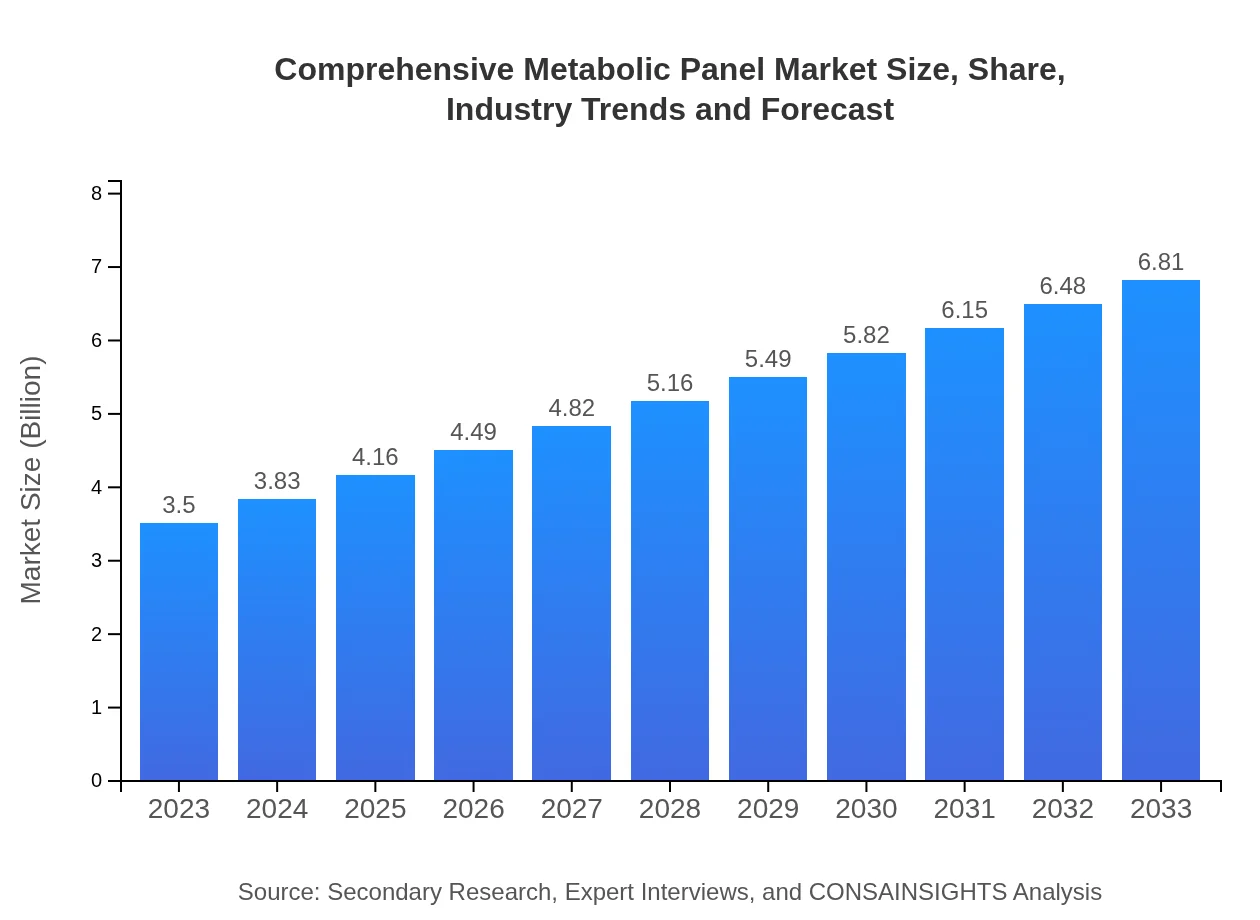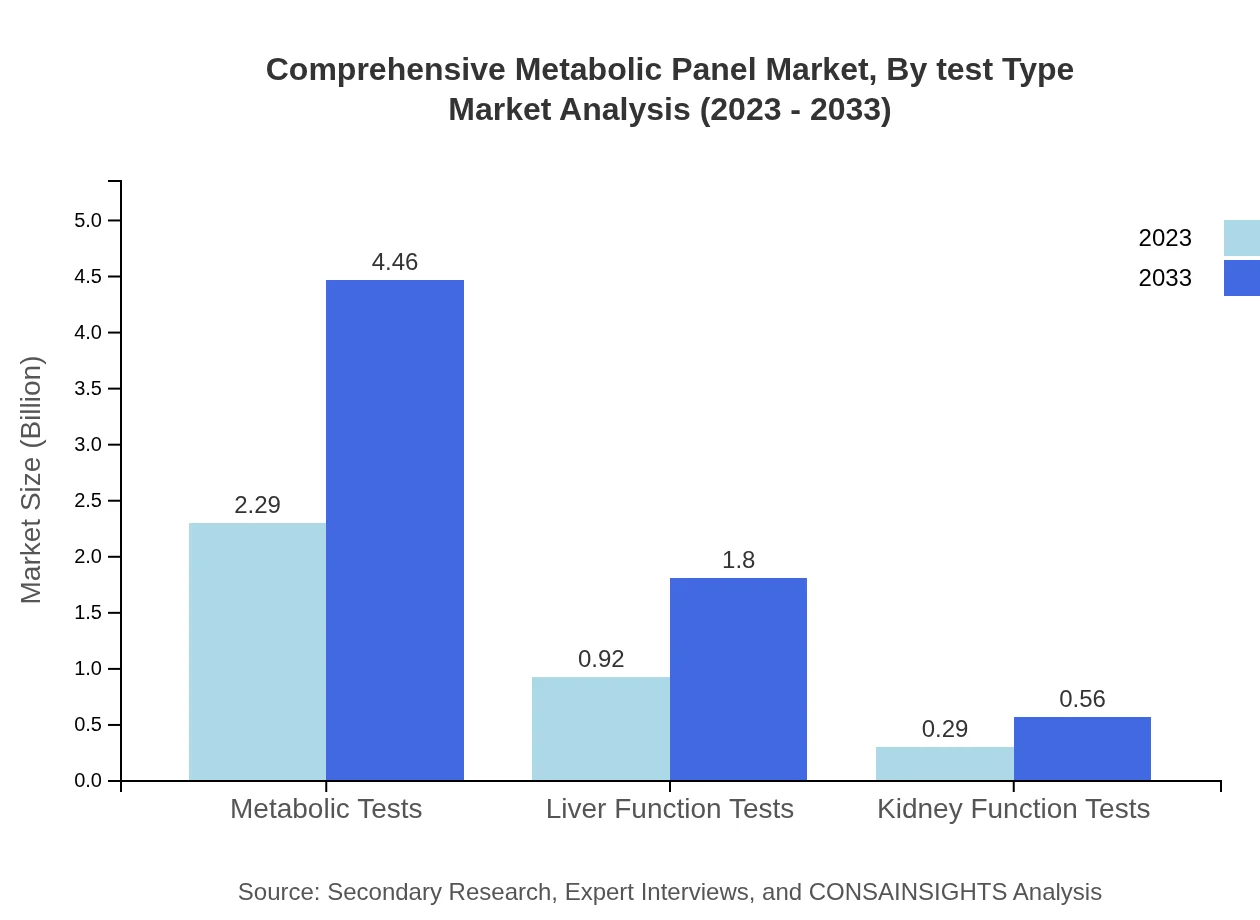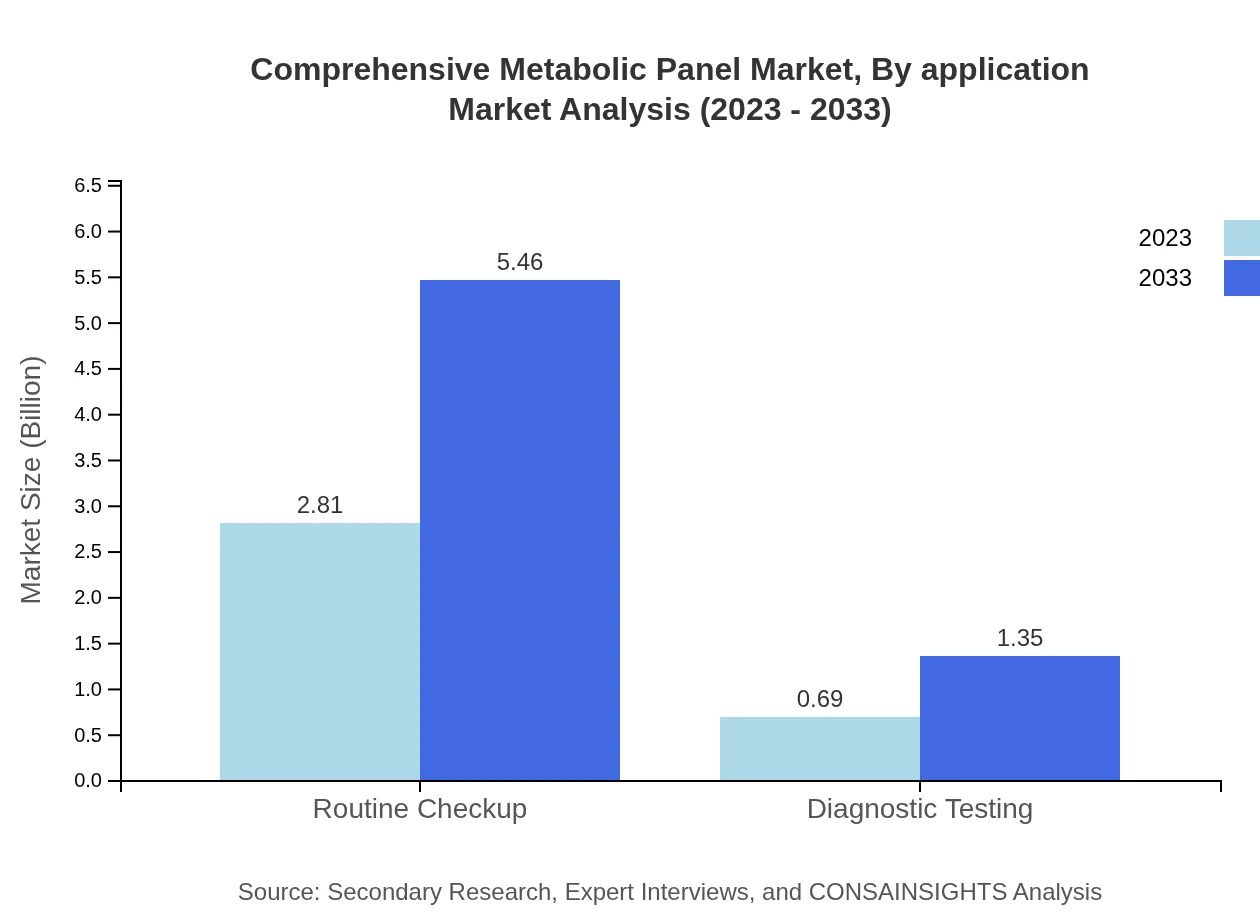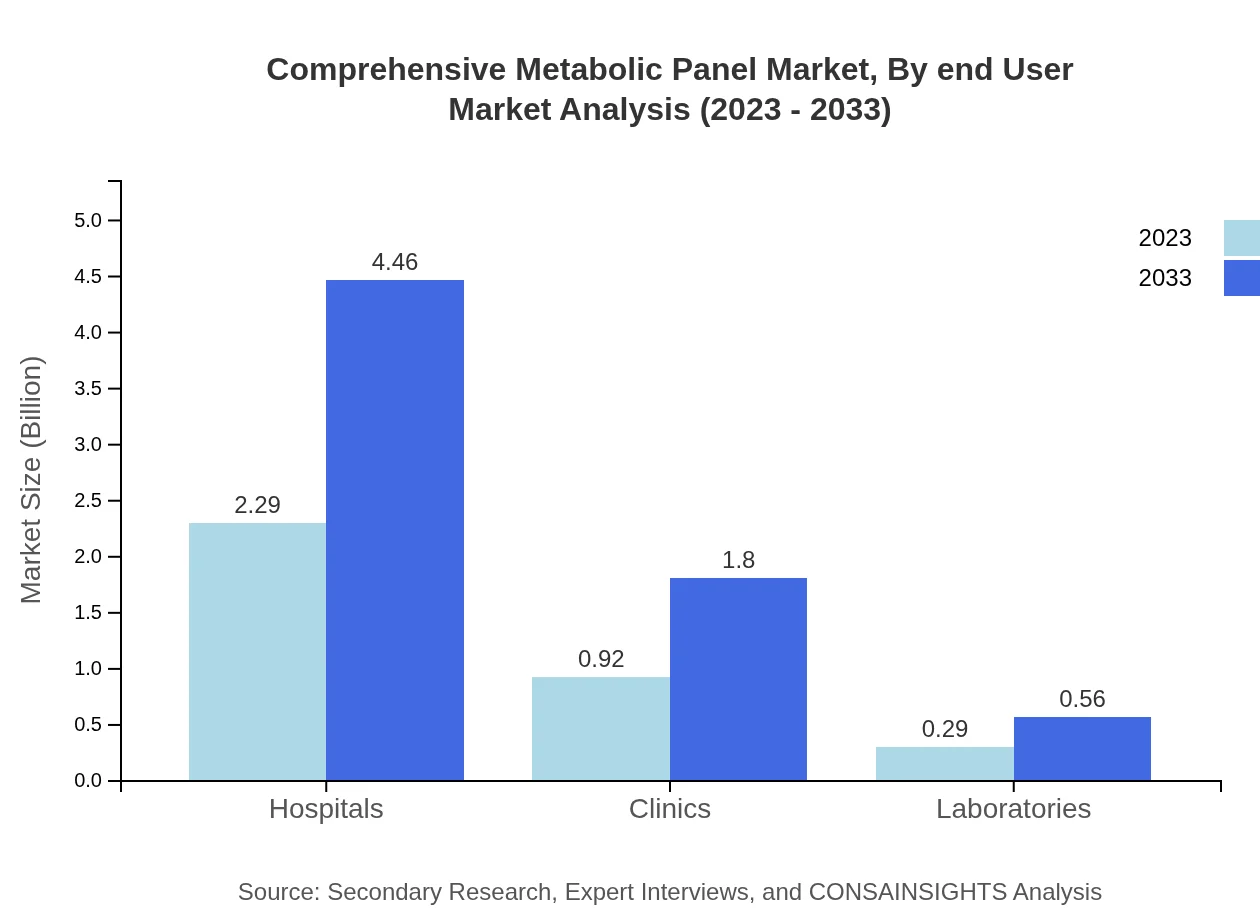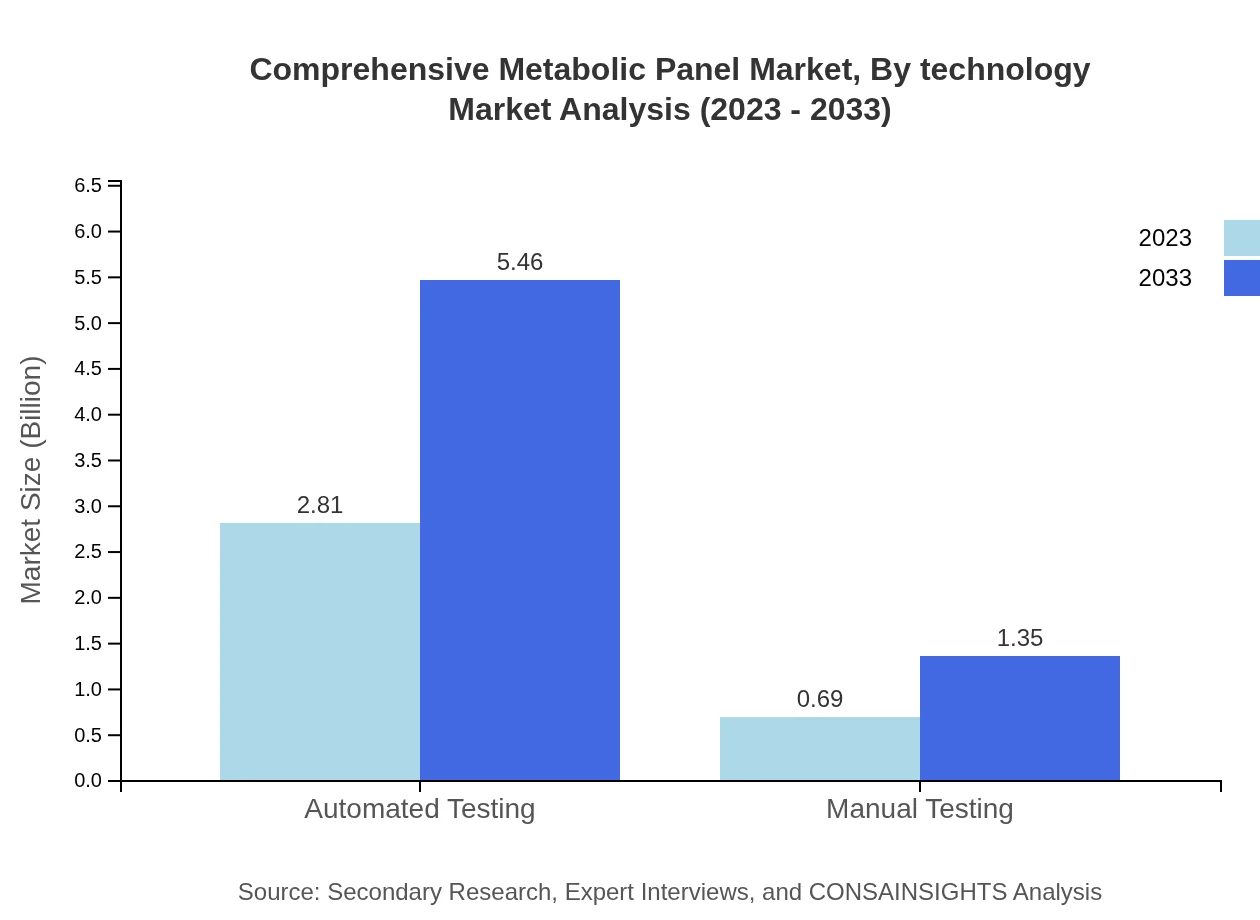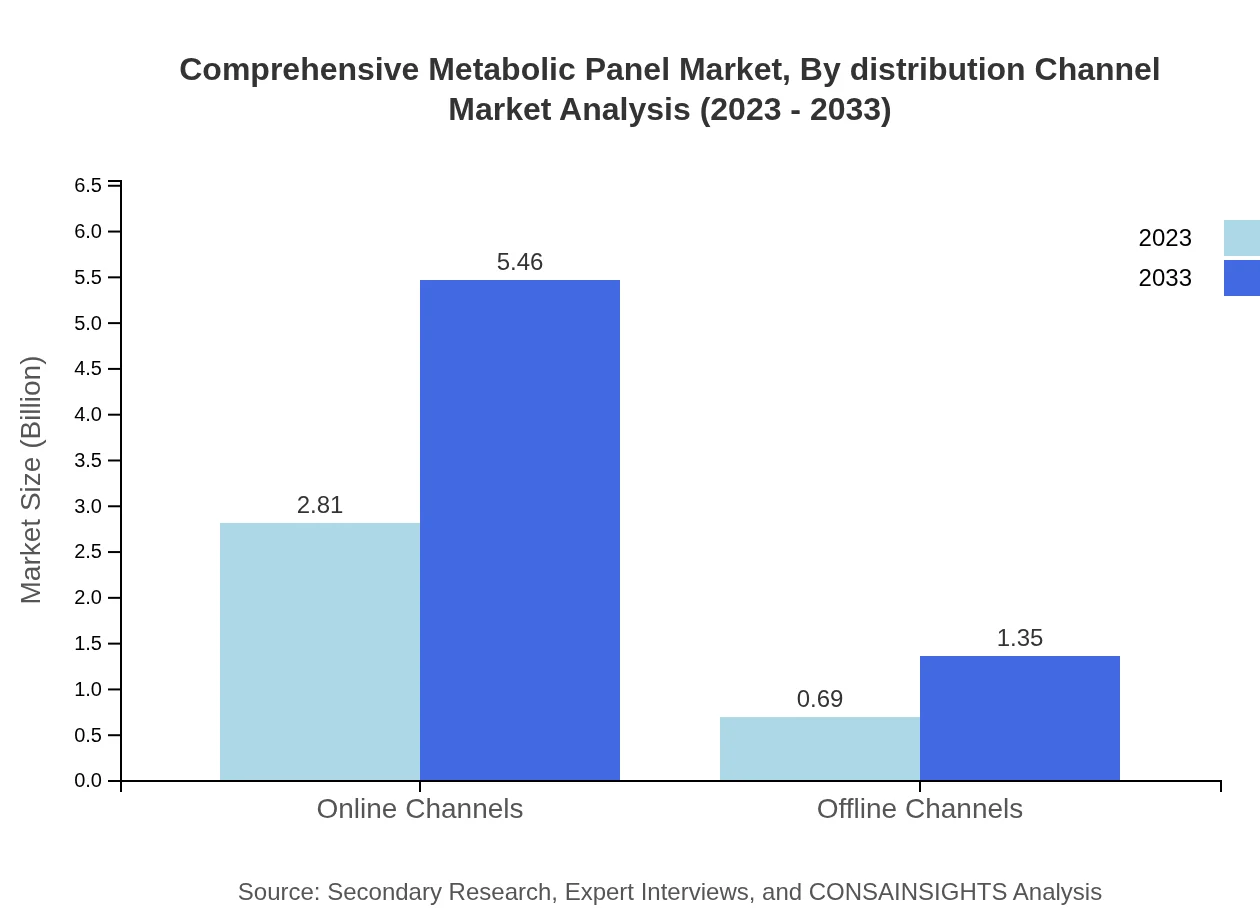Comprehensive Metabolic Panel Market Report
Published Date: 31 January 2026 | Report Code: comprehensive-metabolic-panel
Comprehensive Metabolic Panel Market Size, Share, Industry Trends and Forecast to 2033
This report provides an in-depth analysis of the Comprehensive Metabolic Panel market from 2023 to 2033. It discusses market size, growth prospects, key players, and trends, offering comprehensive insights into regional and segmental performance.
| Metric | Value |
|---|---|
| Study Period | 2023 - 2033 |
| 2023 Market Size | $3.50 Billion |
| CAGR (2023-2033) | 6.7% |
| 2033 Market Size | $6.81 Billion |
| Top Companies | Abbott Laboratories, Roche Diagnostics, Siemens Healthineers, Thermo Fisher Scientific, Ortho Clinical Diagnostics |
| Last Modified Date | 31 January 2026 |
Comprehensive Metabolic Panel Market Overview
Customize Comprehensive Metabolic Panel Market Report market research report
- ✔ Get in-depth analysis of Comprehensive Metabolic Panel market size, growth, and forecasts.
- ✔ Understand Comprehensive Metabolic Panel's regional dynamics and industry-specific trends.
- ✔ Identify potential applications, end-user demand, and growth segments in Comprehensive Metabolic Panel
What is the Market Size & CAGR of Comprehensive Metabolic Panel market in 2033?
Comprehensive Metabolic Panel Industry Analysis
Comprehensive Metabolic Panel Market Segmentation and Scope
Tell us your focus area and get a customized research report.
Comprehensive Metabolic Panel Market Analysis Report by Region
Europe Comprehensive Metabolic Panel Market Report:
Europe's Comprehensive Metabolic Panel market is expected to grow from $1.00 billion to $1.95 billion from 2023 to 2033, driven by an increasing aging population and rising demand for preventive healthcare.Asia Pacific Comprehensive Metabolic Panel Market Report:
The Asia Pacific market for Comprehensive Metabolic Panels is projected to grow from $0.73 billion in 2023 to $1.42 billion in 2033, benefitting from rapid urbanization, increased disposable incomes, and a rising emphasis on healthcare infrastructure improvements.North America Comprehensive Metabolic Panel Market Report:
North America is anticipated to witness the most significant growth, with the market rising from $1.18 billion in 2023 to $2.31 billion in 2033. The existence of major healthcare players and advancements in healthcare technology are key contributors.South America Comprehensive Metabolic Panel Market Report:
In South America, the market is expected to expand from $0.13 billion to $0.25 billion over the same period. Growth is powered by the increasing prevalence of lifestyle-related diseases and growing health awareness among the populace.Middle East & Africa Comprehensive Metabolic Panel Market Report:
The region's market is projected to double, climbing from $0.45 billion in 2023 to $0.88 billion by 2033, fueled by improvements in healthcare access and public health initiatives aimed at disease prevention.Tell us your focus area and get a customized research report.
Comprehensive Metabolic Panel Market Analysis By Test Type
The analysis indicates that the metabolic tests segment holds a substantial share of the market, projected at $2.29 billion in 2023 and increasing to $4.46 billion by 2033. Liver function tests and kidney function tests also play significant roles, reflecting comprehensive assessment needs in patient diagnostics.
Comprehensive Metabolic Panel Market Analysis By Application
The market analysis shows a distinct division into routine checkups and diagnostic testing, with the routine checkup segment dominating the share at 80.16% in 2023 and retaining the same percentage in 2033, highlighting the importance of preventive health check-ups.
Comprehensive Metabolic Panel Market Analysis By End User
Hospitals lead in market size and share, accounting for $2.29 billion and 65.41% in 2023. Clinics and laboratories also contribute significantly but are on a slower growth trajectory compared to hospitals.
Comprehensive Metabolic Panel Market Analysis By Technology
Automated testing methods are increasingly preferred, representing an 80.16% share in 2023 and projected to rise to $5.46 billion by 2033, as laboratories aim to improve efficiency and accuracy.
Comprehensive Metabolic Panel Market Analysis By Distribution Channel
Online channels are commanding 80.16% market share, making them pivotal for reaching consumers effectively as telehealth solutions gain traction in modern healthcare delivery.
Comprehensive Metabolic Panel Market Trends and Future Forecast
Tell us your focus area and get a customized research report.
Global Market Leaders and Top Companies in Comprehensive Metabolic Panel Industry
Abbott Laboratories:
A global leader in healthcare, Abbott manufactures a wide array of diagnostic products, including several panel tests for comprehensive metabolic analysis, aiding in quick and accurate patient assessments.Roche Diagnostics:
Roche is known for its cutting-edge technologies in diagnostic testing, including automated CMP testing solutions that enhance lab efficiency and accuracy.Siemens Healthineers:
Siemens specializes in medical devices and healthcare solutions, providing advanced CMP testing systems that support better disease management.Thermo Fisher Scientific:
Thermo Fisher is a prominent player in the diagnostics space, offering a range of CMPs and diagnostic assays for clinical laboratories.Ortho Clinical Diagnostics:
Ortho focuses on blood testing products, including comprehensive metabolic tests, enhancing patient care through improved diagnostic capabilities.We're grateful to work with incredible clients.









FAQs
What is the market size of Comprehensive Metabolic Panel?
The Comprehensive Metabolic Panel market is valued at approximately $3.5 billion in 2023, with a projected CAGR of 6.7% through 2033, indicating robust growth driven by increasing healthcare needs.
What are the key market players or companies in the Comprehensive Metabolic Panel industry?
Key players in the Comprehensive Metabolic Panel market typically include major healthcare and laboratory firms, diagnostic companies, and biotechnology firms, which are essential in offering innovative testing solutions and diagnostic services.
What are the primary factors driving the growth in the Comprehensive Metabolic Panel industry?
Growth is significantly influenced by increasing prevalence of metabolic disorders, advancements in diagnostic technologies, and a growing focus on preventive healthcare, which drives the demand for comprehensive metabolic testing.
Which region is the fastest Growing in the Comprehensive Metabolic Panel?
North America is the fastest-growing region, projected to expand from $1.18 billion in 2023 to $2.31 billion by 2033, reflecting increased healthcare expenditure and awareness for metabolic testing.
Does ConsaInsights provide customized market report data for the Comprehensive Metabolic Panel industry?
Yes, ConsaInsights does provide customized market report data tailored to specific needs in the Comprehensive Metabolic Panel industry, enabling stakeholders to obtain focused insights and analysis.
What deliverables can I expect from this Comprehensive Metabolic Panel market research project?
Deliverables include comprehensive reports, detailed market analysis, trends, competitor information, and forecasts, which empower stakeholders to make informed strategic decisions.
What are the market trends of Comprehensive Metabolic Panel?
Market trends indicate a shift towards automated testing methods, an increase in routine health check-ups, and expanding online channels for testing services, enhancing accessibility and efficiency.

